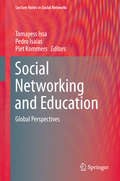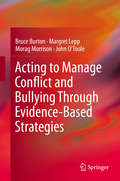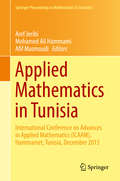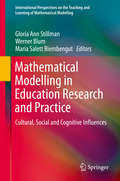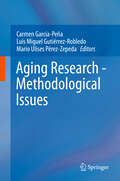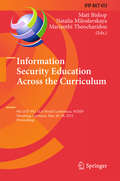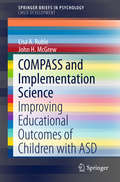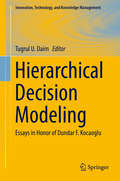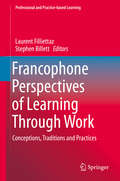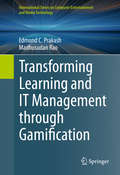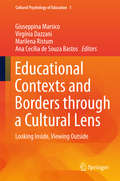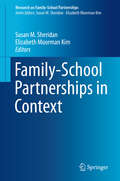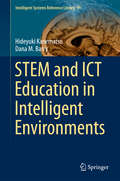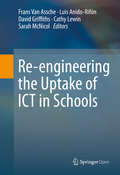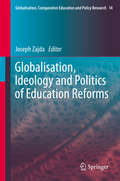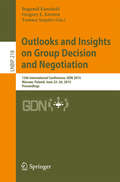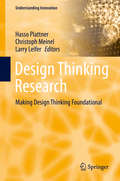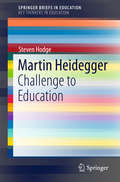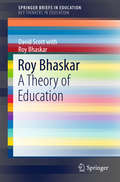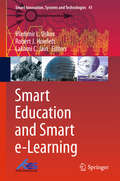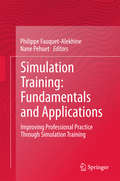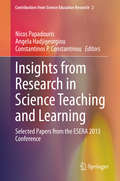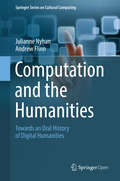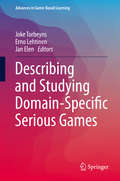- Table View
- List View
University Evolution, Entrepreneurial Activity and Regional Competitiveness
by Silvio Vismara Michele Meoli David Audretsch Erik LehmannThis book aims to bring together different contributions highlighting how the recent changes that modify universities' activities, such as the necessity to internationalize and crucially rely on third party funding, and the new entrepreneurial trajectories stemming from the recent economic-financial crisis, contribute to emphasize the existing differences between successful and lagging regions, as occurred at a country level (e. g. Southern Europe). This book should be of interest to economists, sociologists, political scientists as well as to policy makers and practitioners involved in the creation of value at a local level.
Social Networking and Education
by Pedro Isaias Tomayess Issa Piet KommersThe present work is intended to assist academics, researchers and proponents of online learning and teaching. Academics will be able to share the findings presented in this book, and the Social Networking and Education Model (SNEM), with their students (i. e. Masters and PhD). It is envisaged that this book will assist researchers and anyone interested in online learning to understand the opportunities and risks associated with the use of Social Networking in the education sector, and assist them to implement SN by means of the new SNEM model. The reader will benefit from our examinations of the risks and opportunities associated with the use of Social Networking in the education sector in various regions around the world: Asia-Pacific, Europe, Mediterranean, America, Middle East and the Caribbean. In addition, a Social Networking and Education Model (SNEM) will be developed to promote and implement Social Networking in the education sector.
Acting to Manage Conflict and Bullying Through Evidence-Based Strategies
by Bruce Burton Margret Lepp Morag Morrison John O'TooleThis book offers a complete and detailed account of the evolution of an internationally successful, evidence-based program that has been the result of almost two decades of action research into conflict and bullying. It addresses one of the most serious problems encountered in schools and work places worldwide: that of bullying and inter-personal conflict. The book presents a comprehensive account of the research, development and refinement of the DRACON Project and the Acting Against Bullying and Cooling Conflicts programs. The effective strategies that emerged from the extensive international research and practice use a combination of theories of conflict and bullying management with drama techniques and peer teaching which have been unique in their application. The book analyses their evolution into an effective program that has impacted positively on bullying and conflict in a number of settings. In the UK the program successfully addressed behavioural problems amongst girls in schools through the use of peer teaching in a drama setting. In Sweden the program assists nursing students, nurses and other health professionals to deal with conflict in the workplace. In Australia it has been applied in hundreds of schools to reduce bullying and assist newly arrived refugees to deal with cultural conflict and develop resilience and self- identity in their new country. This volume makes a major and authentic contribution to the international effort to find effective strategies and techniques to deal with interpersonal conflict and bullying across a range of contexts.
Applied Mathematics in Tunisia: International Conference on Advances in Applied Mathematics (ICAAM), Hammamet, Tunisia, December 2013 (Springer Proceedings in Mathematics & Statistics #131)
by Aref Jeribi Mohamed Ali Hammami Afif MasmoudiThis contributed volume presents some recent theoretical advances in mathematics and its applications in various areas of science and technology. Written by internationally recognized scientists and researchers, the chapters in this book are based on talks given at the International Conference on Advances in Applied Mathematics (ICAAM), which took place December 16-19, 2013, in Hammamet, Tunisia. Topics discussed at the conference included spectral theory, operator theory, optimization, numerical analysis, ordinary and partial differential equations, dynamical systems, control theory, probability, and statistics. These proceedings aim to foster and develop further growth in all areas of applied mathematics.
Mathematical Modelling in Education Research and Practice
by Werner Blum Gloria Ann Stillman Maria Salett BiembengutIn this volume cultural, social and cognitive influences on the research and teaching of mathematical modelling are explored from a variety of theoretical and practical perspectives. The authors of the current volume are all members of the International Community of Teachers of Mathematical Modelling and Applications, the peak research body in this field. A distinctive feature of this volume is the high number of authors from South American countries. These authors bring quite a different perspective to modelling than has been showcased in previous books in this series, in particular from a cultural point of view. As well as recent international research, there is a strong emphasis on pedagogical issues including those associated with technology and assessment, in the teaching and learning of modelling. Applications at various levels of education are exemplified. The contributions reflect common issues shared globally and represent emergent or on-going challenges.
Aging Research - Methodological Issues
by Carmen García-Peña, Luis Miguel Gutiérrez-Robledo and Mario Ulises Pérez-ZepedaThis book reviews classical epidemiological and clinical research studies, with a focus on aging. Chapters cover methodological topics like the scientific method, ethics, and the consequences of certain exclusion criteria and the work includes a look at clinical concepts like multi morbidity, frailty and functionality. The authors reveal the issues and challenges for researchers of age and aging, and also consider the translation of scientific knowledge, from basic to clinical and from clinical to public policies of social and health care.The focus on aging is what gives this book its valuable perspective on research methodology. All authors have considerable experience in aging, geriatrics or gerontology and each chapter includes both a theoretical framework and practical examples of studies in aging. Readers will discover study designs that are reviewed for basic structure, main flaws and advantages and are analyzed for specific conditions and variables regarding aging.This text is suited to both health care professionals caring for older adults and researchers who are new to research in aging. It is relevant across the disciplines, including medicine, psychology, social sciences and dentistry and it supports learning with graphs and figures.
Information Security Education Across the Curriculum: 9th IFIP WG 11.8 World Conference, WISE 9, Hamburg, Germany, May 26-28, 2015, Proceedings (IFIP Advances in Information and Communication Technology #453)
by Matt Bishop Natalia Miloslavskaya Marianthi TheocharidouThis book constitutes the refereed proceedings of the 9th IFIP WG 11.8 World Conference on Security Education, WISE 9, held in Hamburg, Germany, in May 2015. The 11 revised papers presented together with 2 invited papers were carefully reviewed and selected from 20 submissions. They are organized in topical sections on innovative methods, software security education, tools and applications for teaching, and syllabus design.
COMPASS and Implementation Science: Improving Educational Outcomes of Children with ASD (SpringerBriefs in Psychology)
by John H. Mcgrew Lisa A. RubleThis Brief examines COMPASS - the Collaborative Model for Promoting Competence and Success - a consultation-based intervention specialized for children with Autism Spectrum Disorder (ASD). Based on the Evidence-Based Practices in Psychology (EBPP) framework, the volume describes the processes that strengthen the expert support relationships between consultant and teacher (i. e. , implementation) and between teacher and student (i. e. , intervention). In addition, the Brief addresses how consultation methods work within COMPASS, with teachers learning from consultants' implementation methods to tailor instructions that are specific to students' educational and personal factors. This unique framework corresponds with current, widespread research and aims to provide more effective educational services for students with ASD during their crucial formative years. Topics featured in this text include: COMPASS practice outcome based on idiographic assessment and measures of quality. Evidence for the efficacy of COMPASS. COMPASS implementation quality. COMPASS intervention quality and active ingredients. Teacher and student internal and external factors impacting COMPASS. COMPASS and Implementation Science is a must-have resource for clinicians, scientist-practitioners, researchers, and graduate students in the fields of child and school psychology, behavioral therapy, and social work as well as rehabilitation, special education, and speech pathology.
Hierarchical Decision Modeling
by Tugrul U. DaimThis volume, developed in honor of Dr. Dundar F. Kocaoglu, aims to demonstrate the applications of the Hierarchical Decision Model (HDM) in different sectors and its capacity in decision analysis. It is comprised of essays from noted scholars, academics and researchers of engineering and technology management around the world. This book is organized into five parts: Technology Policy Planning, Strategic Technology Planning, Technology Assessment, Application Extensions, and Methodology Extensions. Dr. Dundar F. Kocaoglu is one of the pioneers of multiple decision models using hierarchies, and creator of the HDM in decision analysis. HDM is a mission-oriented method for evaluation and/or selection among alternatives. A wide range of alternatives can be considered, including but not limited to, different technologies, projects, markets, jobs, products, cities to live in, houses to buy, apartments to rent, and schools to attend. Dr. Kocaoglu's approach has been adopted for decision problems in many industrial sectors, including electronics research and development, education, government planning, agriculture, energy, technology transfer, semiconductor manufacturing, and has influenced policy locally, nationally, and internationally. Moreover, his students developed advanced tools and software applications to further improve and enhance the robustness of the HDM approach. Dr. Kocaoglu has made many contributions to the field of Engineering and Technology Management. During his tenure at Portland State University, he founded the Engineering and Technology Management program, where he served as Program Director and later, Department Chair. He also started the Portland International Conference on Management of Engineering and Technology (PICMET), which organizes an annual conference in international locations such as Korea, Turkey, South Africa, Thailand, and Japan. His teaching has won awards and resulted in a strong sense of student loyalty among his students even decades later. Through his academic work and research, Dr. Kocaoglu has strongly supported researchers of engineering management and has provided tremendous service to the field. This volume recognizes and celebrates Dr. Kocaoglu's profound contributions to the field, and will serve as a resource for generations of researchers, practitioners and students.
Francophone Perspectives of Learning Through Work
by Stephen Billett Laurent FilliettazThis book generates a comprehensive account of ways in which practice-based learning has been conceptualized in the Francophone context. Learning for occupations, and the educational and practice-based experiences supporting it are the subject of increased interest and attention globally. Governments, professional bodies, workplaces and workers are now looking for experiences that support the initial and ongoing development of occupational capacities. Consequently, more attention is being given to workplaces as sites for this learning. This focus on learning through work has long been emphasised in the Francophone world, which has developed distinct traditions and conceptions of associations between work and learning. These include ergonomics and professional didactics. Yet, whilst being accepted and of long standing in the Francophone world, these conceptions and traditions, and the practices supporting them are little known about or understood in the Anglophone world, which is the dominant medium for scientific and educational discussion. This book addresses this problem through drawing on accounts from France, Switzerland and Canada that make accessible and elaborate these traditions, conceptions and practices through examples of their applications to occupationally related learning. These accounts offer variations and culturally-specific developments of these traditions, but collectively emphasize a preoccupation with how both work and learning need to be understood through situated considerations of persons enacting their work practice. In this way, they offer noteworthy and worthwhile contributions to contemporary global considerations of learning through work.
Transforming Learning and IT Management through Gamification
by Edmond C. Prakash Madhusudan RaoThis book explains how gamification, specifically enterprise gamification, can help mangers in multiple areas within an enterprise to improve attrition. Employee Engagement is an important component to foster employee relations with the organization. Gamification by its inherent design helps to increase engagement within an enterprise. Several successful case studies in Gamification are presented, which present new practical tips for Gamification for IT Management. By introducing general IT management concepts related to the specific environment managers work in, the authors then detail the benefits of introducing gamification in this very environment to resolve business issues. IT Managers, as well as HR professionals, Group Heads and Delivery Leaders will find this be a useful resource to understand how Gamification can improve their everyday work. The book can also be used as a reference for engaging learners and employees to improve their productivity in organizations.
Educational Contexts and Borders through a Cultural Lens
by Giuseppina Marsico Virgínia Dazzani Marilena Ristum Ana Cecília de Souza BastosThis book provides a "context" of discussion for researchers and educational experts in order to rethink the relationship between actors, practices and borders within the educational contexts. The research in educational psychology has often challenged the concept of "educational context". According to the different theoretical frameworks, the construct of contexts, their borders and the dimensions to be taken into account have all been defined in different ways. The book offers a reflection that goes from theory to practice and backward from practice to theory. The main research questions the book addresses are how actors, i. e. teachers, parents and students, educators and professionals, with their own identity and social representations, build their educational practices or their shared cultural spaces where knowledge is generated, defining the borders of the educational contexts. The book proposes that a border is a type of membrane within and outside the educational setting bringing together different actors, groups and cultures. The book presents the perspectives of scholars and educational experts from various parts of the world, including Brazil, Argentina, Italy, Japan, and the United Kingdom. They shed light on what happens at the border in different cultural contexts and what the relationship is between the educational setting and the other life contexts or micro-cultures.
Family-School Partnerships in Context
by Susan M. Sheridan Elizabeth Moorman KimThis volume focuses on context considerations in family-school partnership research. The book examines how cultural diversity, including differences in parenting (e. g. , race, education, family history) and diverse school variables (e. g. , location, population, organization,) can affect family-school partnerships. Its bio ecological perspective pinpoints critical areas that studies need to address for real-world utility, such as parental commitment and developmental considerations. Although the book's focus is research, chapters present program designs and evaluations along with ideas for community involvement and policy. The authors also explore the changing landscape for home-school partnerships resulting from the impact of technology, which is rapidly becoming a central player in organizing research and bringing interventions to life. Topics covered include: Complexities in field-based partnership research. Family-centered, school-based interventions. A district leadership approach to school, family and community partnerships. Research issues to forward a policy agenda supporting family-school partnerships. Testing statistical moderation in research on home-school partnerships. Integrating current and evolving knowledge toward future directions for research. Contexts of Family-School Partnerships is a valuable resource for researchers, professionals and graduate students in child and school psychology, educational policy and politics, family studies, developmental psychology, sociology of education, sociology and anthropology.
STEM and ICT Education in Intelligent Environments
by Hideyuki Kanematsu Dana M. BarryThis book combines information communication technology (ICT) with the creative interdisciplinary teaching approach known as STEM (science, technology, engineering and mathematics). It introduces STEM and Creative Education and shows (through examples and creative activities) the importance and impact that ICT has for STEM and modern education. The book describes the audio visual classroom, the use of the Internet, Social Networking and STEM and provides STEM lessons for both the real and virtual worlds. Instructors will find this unique textbook to be very useful with students, of various ages, in creative education and engineering classes. This special book offers something for everyone. It serves as a guide for teachers in charge of science fairs and creative classes, especially those which require STEM education. It also includes activities to help develop creative thinking and problem-solving skills and prepares students who plan to become teachers and mentors of the future. Readers in general can simultaneously enjoy and learn about ICT's impact on STEM and modern education. In addition, e-learning designers and administrators who want to introduce e-learning systems into their organizations can refer to this book as a reference and a resource. The book complements most e-learning and ICT education books which generally focus too much on technical issues.
Re-engineering the Uptake of ICT in Schools
by David Griffiths Cathy Lewin Frans Van Assche Luis Anido Sarah McnicolThis book reports on a novel and comprehensive approach to the uptake of ICT in Schools. It focuses on key questions, pedagogically sound ways of introducing ICT, new technical artifacts supporting the approach, the evaluation in a large-scale validator, and future work. While many innovations in Technology Enhanced Learning (TEL) have emerged over the last two decades, the uptake of these innovations has not always been very successful, particularly in schools. The transition from proof of concept to integration into learning activities has been recognized as a bottleneck for quite some time. This major problem, which is affecting many TEL stakeholders, is the focus of this book which focuses on developing a more effective and efficient approach based on more than 2500 pilots in European classrooms. Teachers, head teachers, and policy makers may benefit from reading how novel learning scenarios can be elaborated, adapted to a local context, and implemented in the classroom; how new technologies can support this process for teachers and their national/regional communities; how teachers and other stakeholders can be educated in such a re-engineering process; how the approach can be scaled up through MOOCs, ambassador schemes, and train-the-trainer programs; how future classroom labs can inspire teachers, head teachers, and policy makers; how teachers and, above all, learners can become more engaged in learning through the adoption of the iTEC approach. Readers with a more technical focus may also be interested in the discussion of recommender systems, the flexible provision of resources and services, the deployment of the cloud in schools, and systems for composing technological support for lesson plans.
Globalisation, Ideology and Politics of Education Reforms
by Joseph ZajdaThis 14th volume in the 24-volume book series sets out to explore the interrelationship between ideology, the state, and education reforms, placing it in a global context. It examines some of the major education reforms and policy issues in a global culture, particularly in the light of recent shifts in accountability, quality and standards-driven education, and policy research. By doing so, it provides a comprehensive picture of the intersecting and diverse discourses of globalisation and policy-driven reforms in education. The book draws upon recent studies in the areas of globalisation, equality, and the role of the state. It explores conceptual frameworks and methodological approaches applicable in the research covering the state, globalisation, and education reforms. It critiques the neo-liberal ideological imperatives of current education and policy reforms, and illustrates the way that shifts in the relationship between the state and education policy affect current trends in education reforms and schooling globally. Individual chapters critically assess the dominant discourses and debates on education and policy reforms. Using diverse comparative education paradigms from critical theory to historical-comparative research, the chapters focus on globalisation, ideology and democracy and examine both the reasons and outcomes of education reforms and policy change. They provide an informed critique of models of accountability, quality and standards-driven education reforms that are informed by Western dominant ideologies and social values. The book also draws upon recent studies in the areas of equity, cultural capital and dominant ideologies in education.
Outlooks and Insights on Group Decision and Negotiation
by Bogumił Kamiński Gregory E. Kersten Tomasz SzapiroThis book constitutes the proceedings of the 15th International Conference on Group Decision and Negotiation, GDN 2015, held in Warsaw, Poland, in June 2015. The GDN meetings aim to bring together researchers and practitioners from a wide spectrum of fields, including economics, management, computer science, engineering, and decision science. From a total of 119 submissions, 32 papers were accepted for publication in this volume. The papers are organized into topical sections on group problem structuring and negotiation, negotiation and group processes, preference analysis and decision support, formal models, voting and collective decision making, conflict resolution in energy and environmental management, negotiation support systems and studies, online collaboration and competition, and market mechanisms and their users.
Design Thinking Research
by Christoph Meinel Hasso Plattner Larry LeiferThis book summarizes the results of the second year in the Design Thinking Research Program, a joint venture of Stanford University in Palo Alto and Hasso Plattner Institute in Potsdam. The authors have taken a closer look at the issue of co-creation from different points-of-view. The concept of co-creation can also be applied to the phase in which new ideas and related thought start to influence companies, the economy, our culture, and society. The perpetual pursuit for inventions, new creations and innovations is inherent in human nature. The concept behind co-creation may sound simple, however, it is both an essential element of Design Thinking and highly complex. It is about creating positive synergies for all parties involved.
Martin Heidegger
by Steven HodgeThis book sets out to explore the challenge to education contained in Heidegger's work. His direct remarks about education are examined and placed in the broader context of his philosophy to create an account of Heidegger's challenge. Martin Heidegger is an undisputed giant of 20th Century thought. During his long academic career he made decisive contributions to philosophy, influencing a host of thinkers in the process including Arendt, Gadamer, Sartre, Merleau-Ponty, Derrida and Foucault. Heidegger inquired into the deepest levels of human being and its social, natural and technological contexts. Although he did not develop a systematic philosophy of education, his philosophical insights and occasional remarks about education make him an interesting and troubling figure for education. Heidegger is of interest to education for his contributions to our understanding of human being and its environment. Heidegger's insights are troubling, too, for many of the assumptions of education. His critiques of humanism and the modern instrumental mindset in particular have significant implications. The work of scholars who have expanded on Heidegger's remarks and those who have been influenced by his philosophy is also surveyed to fill out the examination. A vision of education emerges in which teachers and learners awaken to the deadening influences around them and become attuned to the openness of being.
Roy Bhaskar
by David Scott Roy BhaskarThis book provides an account of an original educational philosophy, developed by one of the most significant philosophers of the late twentieth and early twenty-first centuries, Roy Bhaskar. Though he directed his attention to wider matters than education, his philosophy has implications for the way we can understand how the world is structured and in turn how we can transform it to accommodate a desire for a better arrangement of resources for human well-being. It is thus both a theory of mind and world and in addition, a theory of education. Roy Bhaskar's philosophy has a view on the following important matters: intentionality, agential capacity, materialism, the possibility of describing and changing the world, progression, education and the lifecourse, essentialism and human nature, pedagogy, knowledge and knowledge-development, the formation of the self, curricular aims and objectives, being with other people, the self in the learning process, the relationship between the self (or agency) and the environment, stratification, emergence, representation and its different modes, structures and mechanisms, the dialectic and criticality.
Smart Education and Smart e-Learning
by Lakhmi C. Jain Robert J. Howlett Vladimir L. UskovThis book contains the contributions presented at the 2nd international KES conference on Smart Education and Smart e-Learning, which took place in Sorrento, Italy, June 17-19, 2015. It contains a total of 45 peer-reviewed book chapters that are grouped into several parts: Part 1 - Smart Education, Part 2 - Smart Educational Technology, Part 3 - Smart e-Learning, Part 4 - Smart Professional Training and Teachers' Education, and Part 5 - Smart Teaching and Training related Topics. This book can be a useful source of research data and valuable information for faculty, scholars, Ph. D. students, administrators, and practitioners - those who are interested in innovative areas of smart education and smart e-learning.
Simulation Training: Fundamentals and Applications
by Philippe Fauquet-Alekhine Nane PehuetDrawing on decades of industrial experience, this insightful and practical guide uses case studies and an interdisciplinary perspective to explain the fundamentals of simulation training to improve performance of high-risk professional activities. It seeks to identify those conditions under which simulation training has been shown to improve professional practice while employing extensive real examples. Simulation Training: Fundamentals and Application helps readers to develop their own synthesis of the simulation learning method and to use such training to enhance their skills and performance. Case studies demonstrate five specific theatres of professional practice - the nuclear-power industry, aeronautics, surgery, anesthesia and metallurgy - and then detailed analysis highlights the common factors and key results. The author's background as a Human Factors Consultant, Physicist and Physiologist has enriched studies of humans in work situations, work organization and management and he has also been involved in pedagogical conception of experimental training on simulators based on his experience as a safety expert on nuclear power plant. The book is useful to practitioners, researchers and students, both in industry and in university. It is clearly cross disciplinary as it presents and discusses applications in engineering, professional practice (airline pilots) and medicine.
Insights from Research in Science Teaching and Learning
by Nicos Papadouris Angela Hadjigeorgiou Constantinos P. ConstantinouThis book includes studies that represent the state of the art in science education research and convey a sense of the variation in educational traditions around the world. The papers are organized into six main sections: science teaching processes, conceptual understanding, reasoning strategies, early years science education, and affective and social aspects of science teaching and learning. The volume features 18 papers, selected from the most outstanding papers presented during the 10th European Science Education Research Association (ESERA) Conference, held in Nicosia, Cyprus, in September 2013. The theme of the conference was "Science Education Research for Evidence-based Teaching and Coherence in Learning". The studies presented underline aspects of great relevance in contemporary science education: the need to reflect on different approaches to enhance our knowledge of learning processes and the role of context, designed or circumstantial, formal or non-formal, in learning and instruction. These studies are innovative in the issues they explore, the methods they use, or the ways in which emergent knowledge in the field is represented. The book is of interest to science educators and science education researchers with a commitment to evidence informed teaching and learning.
Computation and the Humanities: Towards an Oral History of Digital Humanities (Springer Series on Cultural Computing)
by Julianne Nyhan Andrew FlinnThis book addresses the application of computing to cultural heritage and the discipline of Digital Humanities that formed around it. Digital Humanities research is transforming how the Human record can be transmitted, shaped, understood, questioned and imagined and it has been ongoing for more than 70 years. However, we have no comprehensive histories of its research trajectory or its disciplinary development. The authors make a first contribution towards remedying this by uncovering, documenting, and analysing a number of the social, intellectual and creative processes that helped to shape this research from the 1950s until the present day. By taking an oral history approach, this book explores questions like, among others, researchers' earliest memories of encountering computers and the factors that subsequently prompted them to use the computer in Humanities research. Computation and the Humanities will be an essential read for cultural and computing historians, digital humanists and those interested in developments like the digitisation of cultural heritage and artefacts. This book is open access under a CC BY-NC 2. 5 license
Describing and Studying Domain-Specific Serious Games
by Jan Elen Joke Torbeyns Erno LehtinenThis book describes research outcomes on domain-specific serious games. The first part of the book focuses on the design and major characteristics of actual (mainly math-related) serious games. The second part of the book presents recent empirical studies on these games, exploring topics such as the effectiveness of serious games for learning and increasing motivation and the influence of learners' domain-specific and game competencies. The integration of serious games into the curriculum and subsequent performance and motivation outcomes are also presented.

